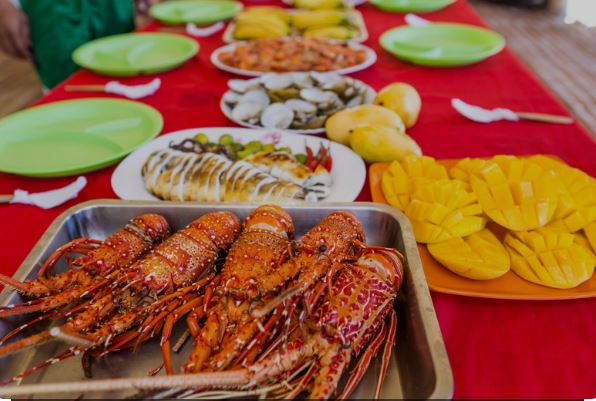Participating in culinary workshops in Palawan provides a delightful opportunity to explore and master the art of preparing local dishes.

Palawan’s cuisine is a delicious fusion of flavors, reflecting the island’s rich cultural heritage and abundant natural resources. From fresh seafood caught in the surrounding waters to tropical fruits grown in the lush forests, Palawan’s ingredients are as diverse as its people. This unique combination has resulted in a culinary tradition that is both satisfying and unforgettable.

Here’s a detailed list of what you might experience in culinary workshops focused on learning local dishes in Palawan:
**1. Introduction to Palawan Cuisine:
- Description:
- Begin the workshop with an introduction to Palawan’s culinary heritage, highlighting the unique flavors, ingredients, and cultural influences that define the local cuisine.
**2. Cooking Classes with Local Chefs:
- Description:
- Engage with experienced local chefs who guide participants through the cooking process.
- Learn traditional cooking techniques, flavor combinations, and the significance of local ingredients.
**3. Seafood Preparation Techniques:
- Description:
- Palawan is renowned for its fresh seafood. Gain hands-on experience in cleaning, filleting, and preparing seafood dishes under the guidance of expert chefs.
**4. Palawan’s Signature Dishes:
- Description:
- Explore the preparation of signature Palawan dishes such as Kinilaw (ceviche), Tamilok (woodworm), and Curacha (spanner crab).
- Understand the cultural significance and regional variations of these dishes.
**5. Local Market Tours:
- Description:
- Embark on guided tours to local markets to learn about the diverse array of fresh produce and ingredients available in Palawan.
- Choose ingredients for your cooking session and gain insights into the importance of market sourcing.
**6. Use of Indigenous Ingredients:
- Description:
- Explore the use of indigenous ingredients such as calamansi, pandan leaves, and local herbs in Palawan’s cuisine.
- Learn how these ingredients contribute to the unique flavors of local dishes.
**7. Preparation of Palawan Delicacies:
- Description:
- Dive into the preparation of Palawan delicacies like Tamilok salad, Nido soup, and Chicken Inasal.
- Understand the nuances of seasoning, marinating, and cooking techniques specific to these dishes.
**8. Rice and Noodle Dishes:
- Description:
- Learn how to prepare staple dishes like Nasi Goreng (fried rice) and Pancit Canton (stir-fried noodles), which are integral to Palawan’s culinary landscape.
**9. Beverage Crafting:
- Description:
- Explore the art of crafting local beverages such as Pandan Juice, Buko Pandan, and Salabat (ginger tea).
- Understand the cultural significance of these beverages and their role in complementing Palawan dishes.
**10. Dessert-Making Sessions:
- Description:
- Delve into the world of Palawan desserts, including specialties like Coconut Pie, Bibingka, and Palitaw.
- Master the techniques for creating delightful and sweet endings to your Palawan culinary journey.
**11. Traditional Cooking Methods:
- Description:
- Experience traditional cooking methods such as using clay pots, open flame, and bamboo utensils.
- Understand the historical context of these methods and their relevance in contemporary Palawan cooking.
**12. Interactive Tasting Sessions:
- Description:
- Engage in interactive tasting sessions where participants can savor the fruits of their labor.
- Receive feedback from chefs and fellow participants, fostering a communal and enjoyable atmosphere.
**13. Culinary Storytelling:
- Description:
- Immerse yourself in culinary storytelling sessions, where chefs share anecdotes and cultural stories related to the dishes being prepared.
- Gain a deeper appreciation for the cultural and historical context of Palawan’s culinary traditions.
**14. Recipe Books and Takeaways:
- Description:
- Receive recipe books or handouts containing the recipes covered during the workshop.
- Take home the knowledge and skills to recreate Palawan dishes in your own kitchen.
**15. Collaborative Cooking:
- Description:
- Foster a sense of community through collaborative cooking sessions.
- Work alongside other participants, sharing tips and techniques to create a variety of Palawan dishes.
**16. Customizable Workshops:
- Description:
- Some culinary workshops offer customizable options, allowing participants to choose specific dishes or focus on particular culinary skills.
- Tailor the workshop to your interests and preferences.
**17. Seasonal Ingredients and Menus:
- Description:
- Depending on the season, workshops may highlight dishes using seasonal ingredients.
- Explore the diversity of Palawan’s cuisine throughout the year.
**18. Farm-to-Table Experiences:
- Description:
- Engage in farm-to-table experiences where you visit local farms to learn about sustainable agriculture practices.
- Understand the importance of fresh, locally sourced ingredients in Palawan’s culinary traditions.
**19. Cooking Competitions:
- Description:
- Some workshops incorporate friendly cooking competitions, adding an element of fun and excitement.
- Compete with fellow participants to create the most delicious and visually appealing dishes.
**20. Culinary Tourism Insights:
- Description:
- Gain insights into the growing trend of culinary tourism in Palawan.
- Learn how local culinary traditions contribute to the overall tourism experience in the region.
Participating in culinary workshops in Palawan is not just about learning to cook; it’s a holistic cultural experience that engages all the senses. From market tours to hands-on cooking sessions and interactive tastings, these workshops offer a deep dive into the heart and soul of Palawan’s culinary heritage.
